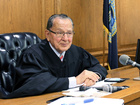Israel's defense minister warned on Friday that Gaza City could be destroyed unless Hamas accepts Israel's terms, as the country prepares for an expanded offensive in the area.
A day after Prime Minister Benjamin Netanyahu said he would authorize the military to mount a major operation to seize Gaza City, Defense Minister Israel Katz warned that the enclave's largest city could "turn into Rafah and Beit Hanoun," areas reduced to rubble earlier in the war.
 Full Story
Full Story
Pope Leo XIV is planning to visit Lebanon this year on his first foreign visit, Maronite Patriarch Beshara al-Rahi said, a trip that would give history's first American pope a chance to speak in broad terms about peace in the Middle East and the plight of Christians there.
A visit to Lebanon could be the second leg of a planned visit to Turkey at the end of November to commemorate an important anniversary with the Orthodox Church.
 Full Story
Full Story
Frank Caprio, a retired municipal judge in Rhode Island who found online fame as a caring jurist and host of " Caught in Providence," has died. He was 88.
His official social media accounts said Wednesday that he "passed away peacefully" after "a long and courageous battle with pancreatic cancer."
 Full Story
Full Story
Giraffes are a majestic sight in Africa with their long necks and distinctive spots. Now it turns out there are four different giraffe species on the continent, according to a new scientific analysis released Thursday.
Researchers previously considered all giraffes across Africa to belong to a single species. New data and genetic studies have led a task force of the International Union for Conservation of Nature to split the tallest mammal on land into four groups — Northern giraffes, reticulated giraffes, Masai giraffes and Southern giraffes.
 Full Story
Full Story
Giraffes are a majestic sight in Africa with their long necks and distinctive spots. Now it turns out there are four different giraffe species on the continent, according to a new scientific analysis released Thursday.
Researchers previously considered all giraffes across Africa to belong to a single species. New data and genetic studies have led a task force of the International Union for Conservation of Nature to split the tallest mammal on land into four groups — Northern giraffes, reticulated giraffes, Masai giraffes and Southern giraffes.
 Full Story
Full Story
Chinese government officials last month showed off what they say will be the world's largest solar farm when completed high on a Tibetan plateau. It will cover 610 square kilometers (235 square miles), which is the size of Chicago.
 Full Story
Full Story
Everton will be showing off its new stadium this weekend. Might Arsenal be showing off a bold new signing?
 Full Story
Full Story
Atletico Madrid revamped its already deep squad this summer with its hopes set on mounting a title challenge in La Liga.
 Full Story
Full Story
When a Ukrainian-made drone attacked an ammunition depot in Russia last September, it showcased Kyiv's determination to strike deep behind enemy lines and the prowess of its defense industry.
The moment was especially gratifying for the woman in charge of manufacturing the drones that flew more than 1,000 kilometers (620 miles) to carry out this mission. For months after, Russia no longer had the means to keep up devastating glide bomb attacks like the one that had just targeted her native city of Kharkiv.
 Full Story
Full Story
China has been expanding use of digital currencies as it promotes wider use of its yuan, or renminbi, to reflect its status as the world's second-largest economy and challenge the overwhelming sway of the U.S. dollar in international trade and finance.
 Full Story
Full Story



